The other day we got together to plan some of the fall activities and celebrate some achievements since last time we saw each other. It was really great to see each other after a long summer apart, and indeed nice to look forward to what we want to achieve.
Odd Friday Seminar & Wine
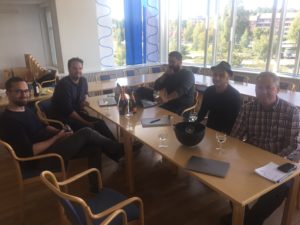 Some of the things we discussed and decided upon include re-starting the Odd Friday seminars. This time we will do it according to the Scancor @ Stanford model – Friday wine. (www.scancor.org). Every Friday the Scancor group have a seminar in the afternoon. When the seminar ends the wine bottles are opened together with some cheese to snack on. The wine and the cheese in turn are prepared by one visiting scholar at a time. The idea is to mimic this, but every second week. Moreover, the seminar is not necessarily on a draft of a paper, but may instead include a brainstorming session, data analysis, read a paper, application review etc. Thus, any activity that is associated with academic life, and that serves the purpose of helping to advance our knowledge about one of the greatest challenges of today; how to make society safer?
Some of the things we discussed and decided upon include re-starting the Odd Friday seminars. This time we will do it according to the Scancor @ Stanford model – Friday wine. (www.scancor.org). Every Friday the Scancor group have a seminar in the afternoon. When the seminar ends the wine bottles are opened together with some cheese to snack on. The wine and the cheese in turn are prepared by one visiting scholar at a time. The idea is to mimic this, but every second week. Moreover, the seminar is not necessarily on a draft of a paper, but may instead include a brainstorming session, data analysis, read a paper, application review etc. Thus, any activity that is associated with academic life, and that serves the purpose of helping to advance our knowledge about one of the greatest challenges of today; how to make society safer?
The schedule is as follows:
- 15:e september – Björn
- 29:e september – Markus
- 13:e oktober – Robert
- 27:e oktober – Thomas
- 10:e november – Ola
- 24:e november – Oscar
Paper bubbles
The second thing we did was to institute the “Paper bubbles”. Every time we get a paper associated with extreme contexts accepted we have a bottle of sparkling wine. This time we had three papers.. More to come!!!
 Lindberg, O, Rantatalo, O. & Stenling, C. (2017) Police bodies and police minds: Professional learning through bodily practices of sport participation. Studies in Continuing Education
Lindberg, O, Rantatalo, O. & Stenling, C. (2017) Police bodies and police minds: Professional learning through bodily practices of sport participation. Studies in Continuing Education
- Svensson, M & Hällgren, M. (2017) Sensemaking in sensory deprived settings: The role of non-verbal auditory cues in emergency assessment. European management journal. In press.
- Lindberg, O, Rantatalo, O. & Hällgren, M. (2017) Making sense through false syntheses: Working with paradoxes in the reorganization of the Swedish police. Scandinavian Journal of management. In press.
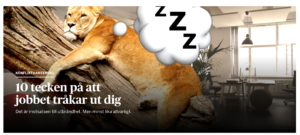 The magazine “Chef” wrote yet a article about boredom. This time it was slightly more extensive and published both on the web and in the magazine itself. Pretty fantastic what kind of coverage this idea has contributed with.
The magazine “Chef” wrote yet a article about boredom. This time it was slightly more extensive and published both on the web and in the magazine itself. Pretty fantastic what kind of coverage this idea has contributed with.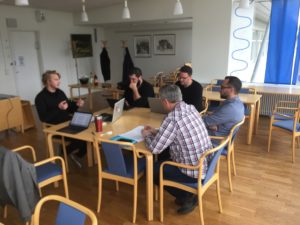
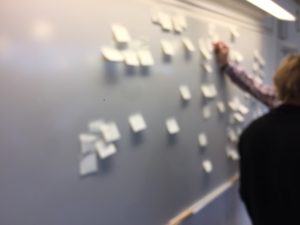 Today we had the second Friday seminar. This time it was Björn´s turn to arrange the seminar. Björn chose a paper that he and Markus is writing on. The seminar included reading the draft of the paper, watching a five minute part of the video-ethnographic material and then making an analysis thereof using Post-Its. Great fun, very useful! And, a great way to end the week with some wine and assorted sausages that followed.
Today we had the second Friday seminar. This time it was Björn´s turn to arrange the seminar. Björn chose a paper that he and Markus is writing on. The seminar included reading the draft of the paper, watching a five minute part of the video-ethnographic material and then making an analysis thereof using Post-Its. Great fun, very useful! And, a great way to end the week with some wine and assorted sausages that followed.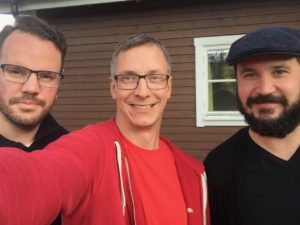
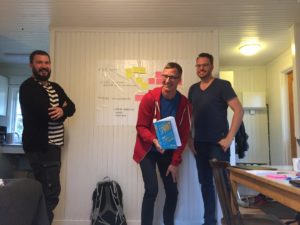 Following the idea of the book
Following the idea of the book 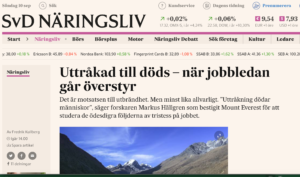 Svenska Dagbladet is collaborating with the magazine Chef. Chef is making another piece on our research on boredom. As part of that they are co-publishing the article in SvD. We are very happy to see that our research and efforts are making such a impact in the media. Hopefully someone reflects and puts it into action! You find the link to the article,
Svenska Dagbladet is collaborating with the magazine Chef. Chef is making another piece on our research on boredom. As part of that they are co-publishing the article in SvD. We are very happy to see that our research and efforts are making such a impact in the media. Hopefully someone reflects and puts it into action! You find the link to the article, 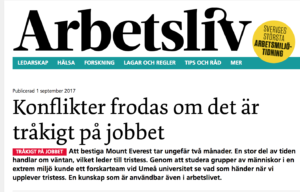 The magazine Arbetsliv is the largest magazine for working environment issues in Sweden. Recently they published a interview with Markus on the research on boredom and its implications for managers regardless of business. You find the article
The magazine Arbetsliv is the largest magazine for working environment issues in Sweden. Recently they published a interview with Markus on the research on boredom and its implications for managers regardless of business. You find the article  Some of the things we discussed and decided upon include re-starting the Odd Friday seminars. This time we will do it according to the Scancor @ Stanford model – Friday wine. (www.scancor.org). Every Friday the Scancor group have a seminar in the afternoon. When the seminar ends the wine bottles are opened together with some cheese to snack on. The wine and the cheese in turn are prepared by one visiting scholar at a time. The idea is to mimic this, but every second week. Moreover, the seminar is not necessarily on a draft of a paper, but may instead include a brainstorming session, data analysis, read a paper, application review etc. Thus, any activity that is associated with academic life, and that serves the purpose of helping to advance our knowledge about one of the greatest challenges of today; how to make society safer?
Some of the things we discussed and decided upon include re-starting the Odd Friday seminars. This time we will do it according to the Scancor @ Stanford model – Friday wine. (www.scancor.org). Every Friday the Scancor group have a seminar in the afternoon. When the seminar ends the wine bottles are opened together with some cheese to snack on. The wine and the cheese in turn are prepared by one visiting scholar at a time. The idea is to mimic this, but every second week. Moreover, the seminar is not necessarily on a draft of a paper, but may instead include a brainstorming session, data analysis, read a paper, application review etc. Thus, any activity that is associated with academic life, and that serves the purpose of helping to advance our knowledge about one of the greatest challenges of today; how to make society safer? Lindberg, O, Rantatalo, O. & Stenling, C. (2017) Police bodies and police minds: Professional learning through bodily practices of sport participation. Studies in Continuing Education
Lindberg, O, Rantatalo, O. & Stenling, C. (2017) Police bodies and police minds: Professional learning through bodily practices of sport participation. Studies in Continuing Education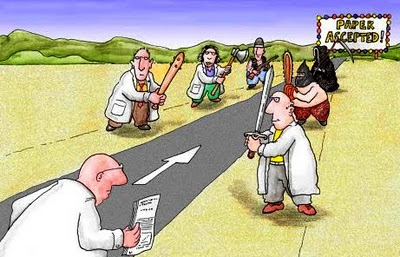 Old news, but good news. Ola, Oscar and Markus had the article “Making sense through false syntheses: Working with paradoxes in the reorganization of the Swedish police” accepted for publication in Scandinavian Journal of management.
Old news, but good news. Ola, Oscar and Markus had the article “Making sense through false syntheses: Working with paradoxes in the reorganization of the Swedish police” accepted for publication in Scandinavian Journal of management.